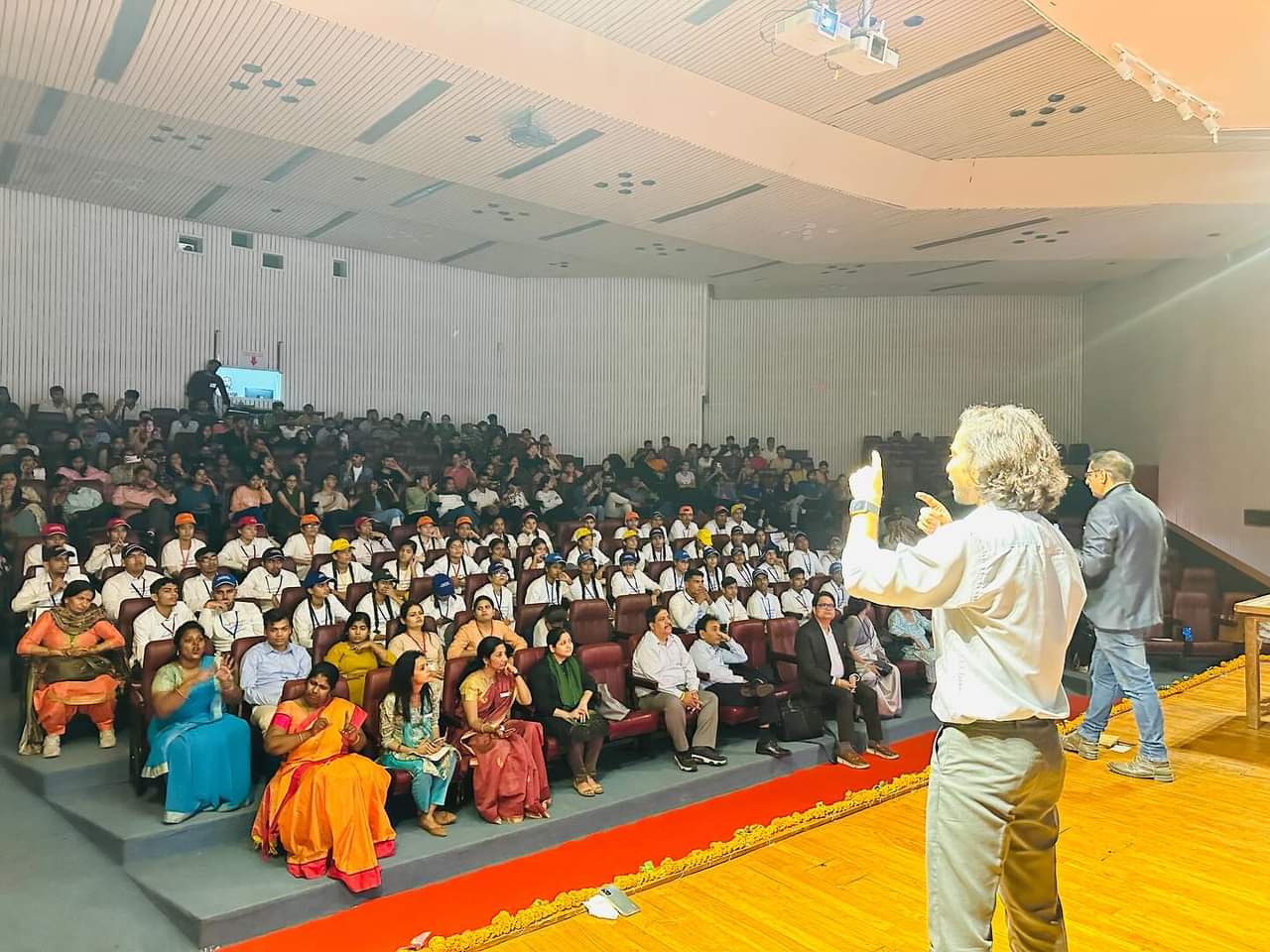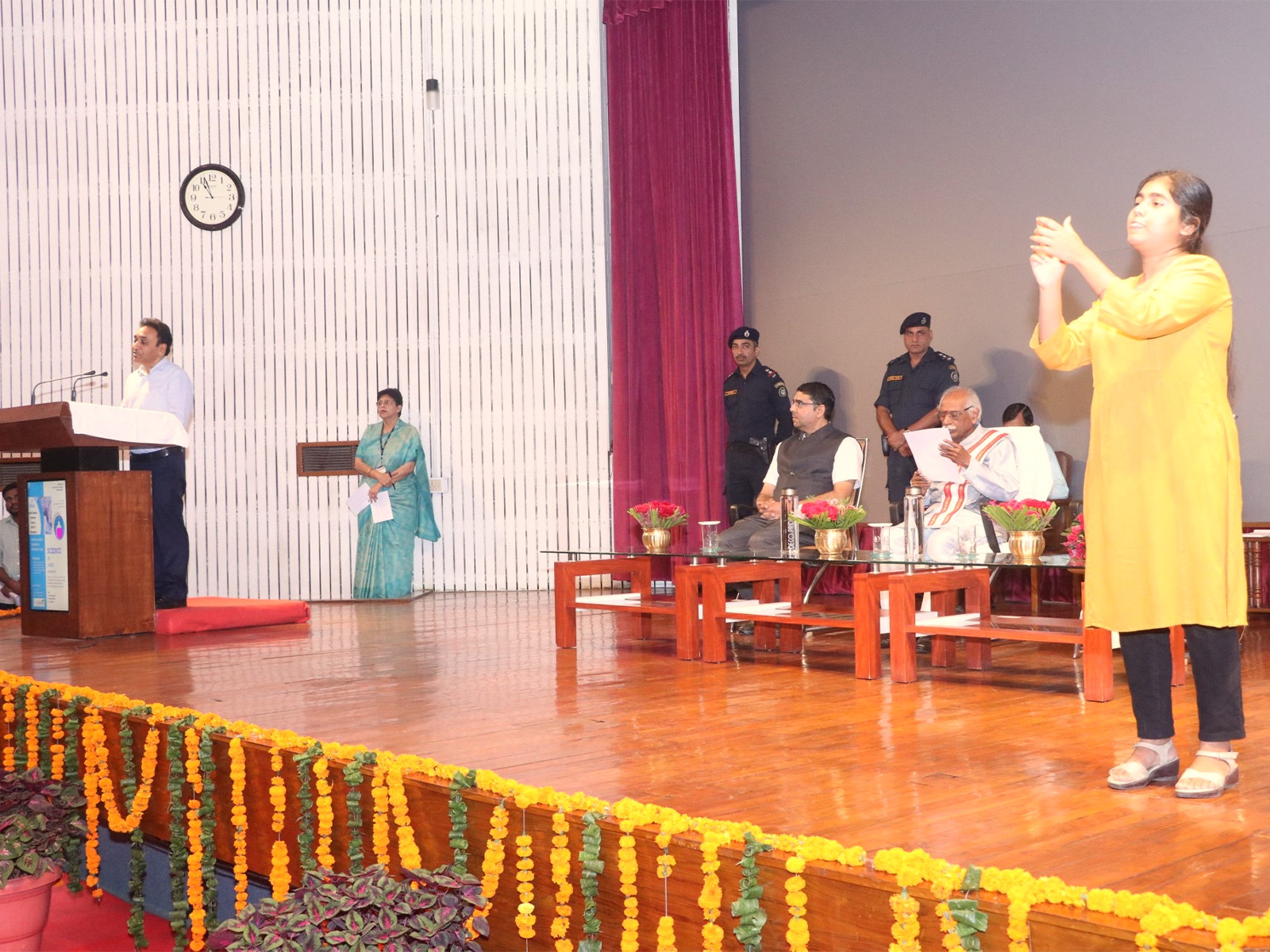Science through sign language – chemistry camps reach new audiences in India
The Royal Society of Chemistry (RSC), India and the CSIR- Institute of Microbial Technology (IMTech), Chandigarh conducted a three-day residential Yusuf Hamied Chemistry Camp, our first for speech and hearing-impaired students, delivering science with sign language.
This is our 54th Chemistry Camp under the RSC Yusuf Hamied Inspirational Science Programme, supported by Dr Yusuf Hamied, through which we promote chemistry at grass roots level. These camps are aimed to build interest and inspire the young school students in Grade IX from diverse backgrounds to pursue chemistry at university and beyond.

Audience in rapt attention during the demonstration of experiments by Dr. Raman Parkesh, Principal Scientist, IMTECH, with sign interpretation from Mr. Hoshiyar of the Indian Sign Language Enabled Virtual Lab of IMTECH Picture: Royal Society of Chemistry

Interpreted in Indian sign language by Ms. Payal, Haryana Welfare Society for Persons with Speech & Hearing Impairment. Also pictured: Director of IMTECH Dr. Sanjeev Khosla, Shri Bandaru Dattatreya, Hon’ble Governor of Haryana, Shri Rajesh Aggarwal, Secretary DEPwd, Government of India Picture: Royal Society of Chemistry
Ajit Sharma, Managing Director, India & South Asia RSC said: “Chemistry camps are one of the most unique outreach activities that we have been conducting since 2014 in collaboration with renowned universities in India. I feel proud of the fact that we have progressed towards a new level in our approach to empower students with special needs who may not be otherwise given his opportunity. The camp is an excellent example of diversity & inclusion which is one of our key themes at global level”.
Dr. Yusuf Hamied said: “We need to encourage and motivate the best students to achieve the knowledge and skills they need to go on to study chemistry at university and, eventually to make a strong contribution to India’s success.”
So far, the RSC has successfully delivered 53 Yusuf Hamied Chemistry Camps in India as part of this initiative since its launch in 2015 across 22 states in India in 13 regional languages to over 3000 students at 1000 + schools, mostly from underprivileged backgrounds.
The programme also supports training teachers and have so far completed Teacher Training workshops for over 40,000 teachers by recruiting and training new Teacher Developers to cover most regions of India.
The initiative is supported by Dr Hamied with £940,000 in its phase-2 with an aim to give Indian teachers new tools for delivering engaging and effective science lessons, and to encourage students to reach the necessary standards to study science at university.

Find out more
Event partners
CSIR-IMTECH
Established in 1984, the CSIR-Institute of Microbial Technology (IMTech) is one among the chain of 37 national laboratories of the Council of Scientific & Industrial Research. The laboratory is equipped with world class instrumentation, facilities and known for its Microbial Type Culture Collection and R &D in the area of Microbiology, Protein Science, immunology, cell biology and many more.
About ISLEVL
Around 6 % of the world's population suffer from hearing loss. In India, there are more than 50 lakh deaf and hard of hearing people as per the Census of 2011. However, we rarely see any of them in STEM (Science, Technology, Engineering and Mathematics) related fields. One of the prime reasons for this is the lack of accessible STEM learning resources. Indian Sign Language enabled Virtual Laboratory of CSIR is aimed at developing specialized digital content to empower and educate the deaf by providing ISL translated content in various streams of STEM subjects. ISLEVL is shortlisted as an innovative ICT intervention for inclusive education under the UN supported ZeroCall 24.
Dr. Alka Rao the camp coordinator and project Leader ISLEVL believes that STEM education can enhance the life skills and employment prospects for the deaf children. The Yusuf Hamied Chemistry camp in the Indian Sign Language is an intervention that will engage the interest of deaf children as well as policy makers.
Director IMTECH Dr. Sanjeev Khosla is of the opinion that inclusive initiatives like these should have started much earlier.
Yusuf Hamied Inspirational Science Programme
The Royal Society of Chemistry (RSC) Yusuf Hamied Inspirational Science Programme – initiated in 2014 with the generous support of Dr Yusuf Hamied (Non-Executive Chairman – Cipla Limited) is a programme wherein RSC will apply its expertise in education along with the experience and capabilities of leading Indian institutional partners to enhance the skills and knowledge of science teachers in India and to inspire students to study science at university.
Royal Society of Chemistry, India
The Royal Society of Chemistry is the world’s leading chemistry community, advancing excellence in the chemical sciences. With over 50,000 members and a knowledge business that spans the globe, we are the UK’s professional body for chemical scientists; a not-for-profit organisation with 175 years of history and an international vision for the future. We promote, support and celebrate chemistry. We work to shape the future of the chemical sciences – for the benefit of science and humanity.